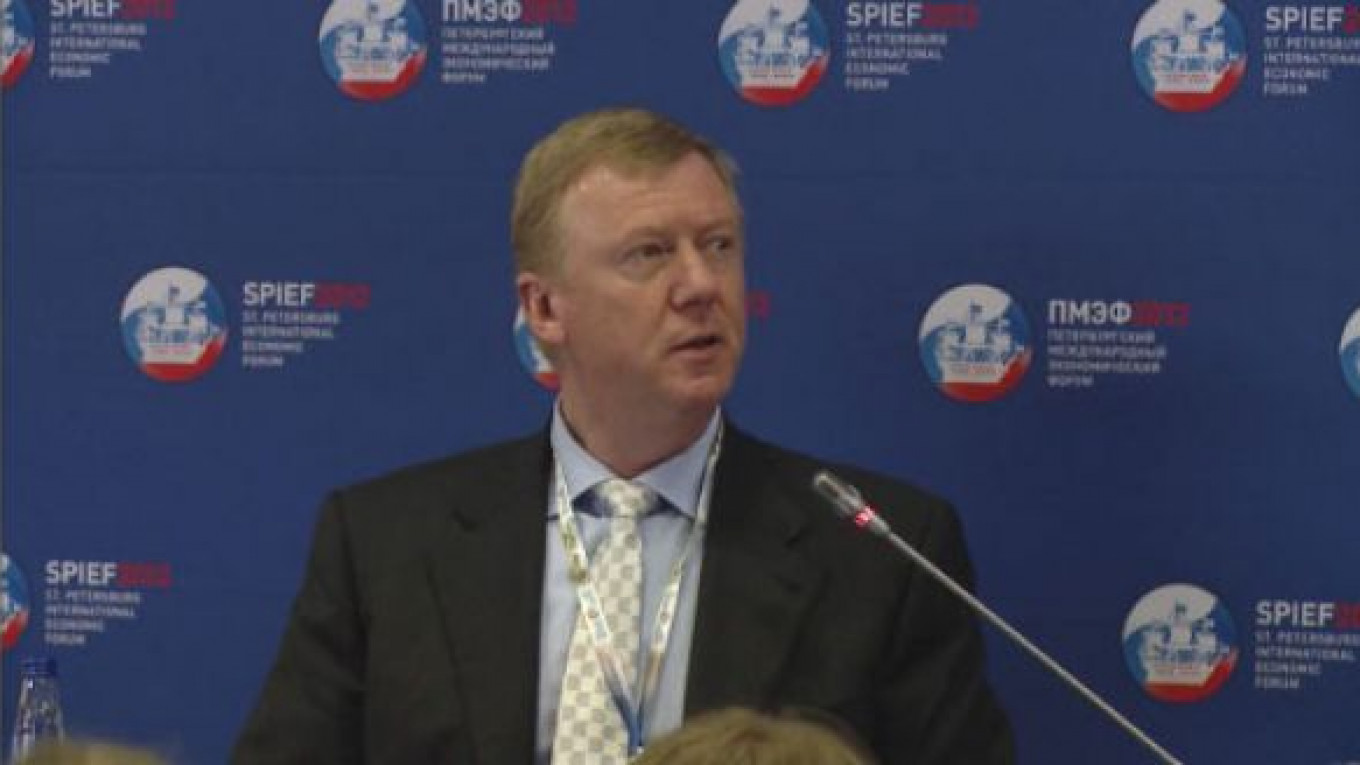ST. PETERSBURG — Russia's relations with the European Union usually earn the spotlight at the St. Petersburg International Economic Forum, but the dialogue skidded eastward Thursday as the Kremlin's vision of a Eurasian Union predominated.
Russian officials trumpeted free-trade initiatives like the proposed Eurasian Union and the new customs union at a session titled "Russia-EU Business Dialogue," and its main speech was delivered by Viktor Khristenko, chairman of the Eurasian Economic Commission.
President Vladimir Putin maintained the eastward focus later in the day during his plenary address.
"Russia is promoting integration projects in the Eurasian space at an unprecedented pace and scale," Putin said. "We see integration as a major source of growth and development."
Russia has been irate at the slow pace of its integration with the EU, including Brussels' refusal to move ahead with its requests for visa-free travel.
Brussels, in turn, has bristled at Russian barriers on EU exports and Putin's declaration earlier this month that the EU is making demands that go beyond the requirements to join the World Trade Organization and are unacceptable to Russia.
The EU, apparently displeased with the state of affairs, dispatched only one official to participate in the Russia-EU session Thursday.
Opening the session, Rusnano director Anatoly Chubais emphasized that the meeting has played a key role at the forum for years, but he said that this time it should be extended beyond the usual agenda.
"Russia now exists in a new zone," Chubais said, referring to the customs union with Belarus and Kazakhstan, which introduced a unified economic space on Jan. 1.
He said the East is the new priority, bringing "titanic changes," and he mentioned a proposal by Prime Minister Dmitry Medvedev last week to adopt a common currency for the Eurasian Union by 2015.
Putin unveiled the idea for the union in October. It is based on EU integration and would include Russia, Belarus, Kazakhstan, Kyrgyzstan and Tajikistan.
"The West is no less important than the East," Chubais said.
But he kept his remarks brief when he spoke about Russia's membership in the World Trade Organization and possible entry into the Organization for Economic Cooperation and Development.
In contrast, Chubais spoke up for the WTO at last year's session, saying Russia's entry would open the door to much closer trade ties with Europe. An agreement on entry was sealed in December.
Moderator Esko Aho, a former Finnish prime minister and executive vice president at Nokia, repeatedly referred to Khristenko as "Mr. Europe," in a nod to his previous role as industry and trade minister.
But Khristenko spoke more like "Mr. Eurasia," saying the Eurasian economic zone is already a reality.
Among the other panelists, Peter Loescher, CEO of Siemens, praised Russia's WTO entry but added that more should be done for "the new economic ecosystem" between Russia and the EU, including relaxation of customs and taxation regulations.
He called for the EU and Russia to work together to build supply chains. "As we know, many supply chains have moved to China," he said.
The sole EU official, the European Commission's deputy director for trade, Peter Balas, bluntly said the EU would welcome the customs union only if it met WTO principles. He added that it didn't.
"Of course the customs union will behave well," replied Alexander Likhachyov, deputy economic development minister.
He complained about EU rules, saying Russia had accepted the fact that when it wants to deal with Finnish customs issues it must go to Brussels.
He noted that Putin has repeatedly said Russia's goal is to build an economic zone from Lisbon to Vladivostok.
While Kazakhstan was mentioned briefly but positively as a growing economy, Belarus was not touched on at all.
Speaking to The Moscow Times, Balas indicated that Belarus is the reason the customs union has failed to meet WTO standards. The EU has tried to isolate Belarus over President Alexander Lukashenko's authoritarian leadership.
Billionaire and Skolkovo Foundation director Viktor Vekselberg, who arrived about 30 minutes into the 90-minute session after dashing over from a Sberbank breakfast, didn't seem convinced by the Russian arguments for closer ties with neighboring countries.
"The WTO is the only way forward," he said. He left before the session ended.
Staff writer Andrew McChesney contributed to this report.
A Message from The Moscow Times:
Dear readers,
We are facing unprecedented challenges. Russia's Prosecutor General's Office has designated The Moscow Times as an "undesirable" organization, criminalizing our work and putting our staff at risk of prosecution. This follows our earlier unjust labeling as a "foreign agent."
These actions are direct attempts to silence independent journalism in Russia. The authorities claim our work "discredits the decisions of the Russian leadership." We see things differently: we strive to provide accurate, unbiased reporting on Russia.
We, the journalists of The Moscow Times, refuse to be silenced. But to continue our work, we need your help.
Your support, no matter how small, makes a world of difference. If you can, please support us monthly starting from just $2. It's quick to set up, and every contribution makes a significant impact.
By supporting The Moscow Times, you're defending open, independent journalism in the face of repression. Thank you for standing with us.
Remind me later.






